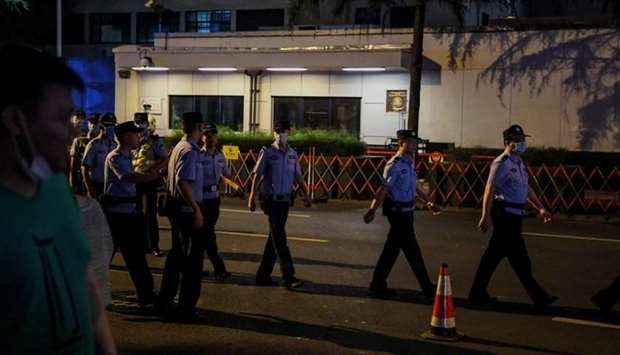China on Friday ordered the US consulate in the southwestern city of Chengdu to close in retaliation for one of its missions in the United States being shuttered, capping a furious week of Cold War-style diplomacy.
The announcement of the closure followed a torrent of warnings from top American officials about the "tyranny" of China, and Chinese nationals being indicted in the United States on various charges.Ordering the Chengdu consulate to cease operation was a "legitimate and necessary response to the unreasonable measures by the United States", the foreign ministry said in a statement.
"The current situation in China-US relations is not what China desires to see, and the US is responsible for all this," it said without saying when it would have to shut down.
The ministry emphasised the closure was directly in response to the US ordering the Chinese consulate in Houston to shut down by Friday.
Some consulate staff "were engaged in activities outside of their capacity, interfered in China's internal affairs, and endangered China's security and interests," foreign ministry spokesman Wang Wenbin told reporters.
US Secretary of State Mike Pompeo said this week the Houston mission was a "hub of spying and intellectual property theft".
Republican Senator Marco Rubio called the consulate the "central node of the Communist Party's vast network of spies and influence operations in the United States".
China described the allegations as "malicious slander".
The order on Houston came a day after the US Justice Department unveiled the indictment of two Chinese nationals for allegedly hacking hundreds of companies and attempting to steal coronavirus vaccine research.
The Justice Department then announced Thursday indictments of four Chinese researchers it said lied about their ties to the People's Liberation Army, with one escaping arrest by taking refuge in China's San Francisco consulate.
Some two-dozen police were stationed in front of the Chengdu consulate -- which was surrounded by a waist-high barricade -- late Friday, according to an AFP journalist, with officers asking individuals taking photos to move along.
Earlier, firecrackers were set off in front of the compound, according to images on state broadcaster CCTV, though one of its reporters added there was a wedding nearby and police at the scene were handling the matter.
The two nations have increasingly tussled over a plethora of issues, including China's handling of the coronavirus pandemic and its efforts to quash a democracy movement in Hong Kong.
In a video call with his German counterpart, Foreign Minister Wang Yi said China still hopes to have mutually respectful cooperation with the US but stands ready to firmly safeguard its national sovereignty and dignity.
"China will not follow the US's dance, but will also never tolerate the US's reckless behaviour," Wang said.
The US administration has ratcheted up the rhetoric and taken increasingly strong actions in recent weeks, which many observers have said is part of President Donald Trump's strategy to win votes in the November elections.
"Today, China is increasingly authoritarian at home, and more aggressive in its hostility to freedom everywhere else," Pompeo, who has helped to leads Trump's offensive, said on Thursday.
"The free world must triumph over this new tyranny."
The US has an embassy in Beijing as well as five consulates in mainland China, plus one in Hong Kong.
The Chengdu consulate, established in 1985, covers the troublesome region of Tibet and has been at the centre of past controversy.
In 2013, China demanded the US provide an explanation for a spying programme after news reports said a top-secret map leaked by fugitive intelligence analyst Edward Snowden showed surveillance facilities at Americans embassies and consulates worldwide -- with the Chengdu consulate among them.
The Chengdu mission was also where senior Chinese official Wang Lijun fled in 2012 from his powerful boss Bo Xilai, who was then head of the nearby metropolis Chongqing.
Victor Shih, associate professor of political science at UC San Diego, said that closing Chengdu instead of a higher profile US mission indicated it was trying to avoid derailing ties completely.
"This response potentially allows the two sides to take a breather in this escalation, and provides room for the Trump administration to assess whether further straining ties with the US' largest trading partner in an economic downturn is advisable," Shih told AFP.

